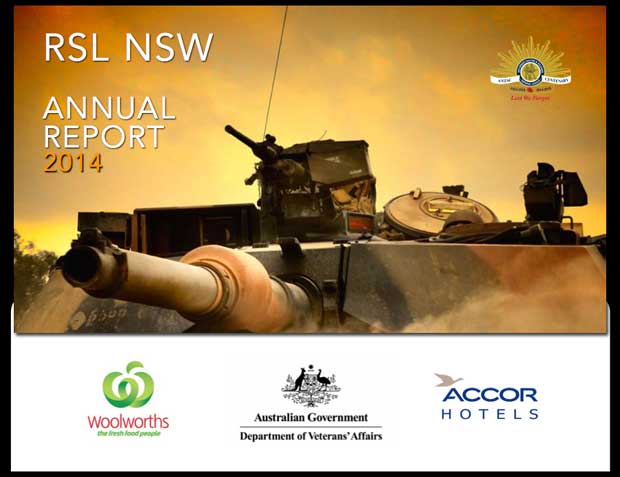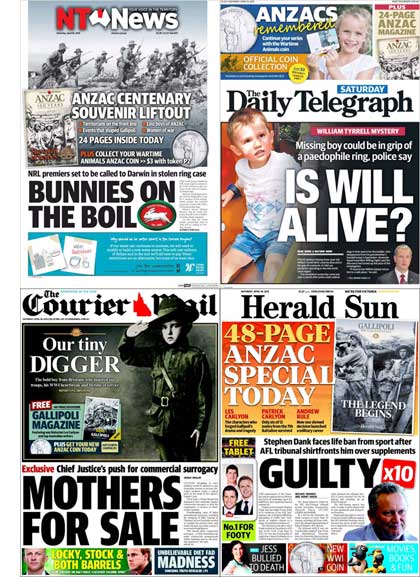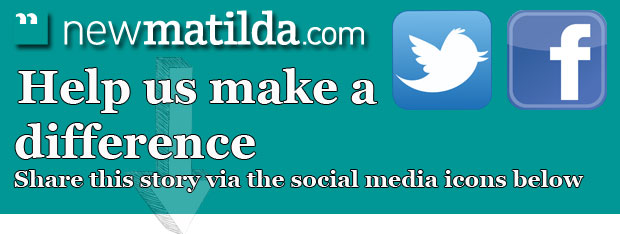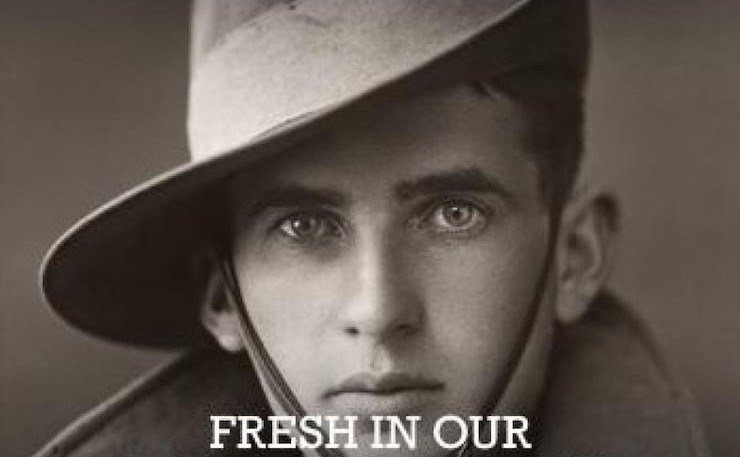I don’t know who invented the phrase ‘You can’t make a silk purse out of a sow’s ear’, but whoever it was, I’m pretty certain they’d never been in Australia on April 25.
On that day, Australians from all walks of life turn out in their tens of thousands to marches and parades all over the country, to solemnly acknowledge the sacrifice of the men and women who served this country in various overseas wars and conflicts.
At least some of us do. Others prefer to get shit-faced, wear the Australian flag like a cape, stalk the streets yelling obscenities at foreign looking people, and then gamble away our money in pubs and clubs on the only day of the year when unregulated gambling is made legal.
April 25, of course, marks the day in which Australian and New Zealand Army Corps landed on the beaches of Gallipoli, the start of a campaign that was to become one of the great military disasters of the First World War.
This year marks the 100th anniversary of that slaughter. And what a commemoration we’re planning.
For well over a year, politicians, bureaucrats and big business have been getting ready for the ‘Anzac Centenary’. It’s a major event, and there’s a lot of money to be made.
The bean counters of this great nation have long known the worth of the term ‘Anzac’, which is why, over 90 years ago, they passed Commonwealth legislation to protect the word, lest anyone try and exploit it for financial gain.
And when I say ‘anyone’, I mean ‘anyone who doesn’t have official permission to exploit it for financial gain… or simply goes to far and crosses some invisible and arbitrary ‘Aussie Aussie Aussie, Oi Oi Oi’ line during said financial exploitation’.
Which brings us neatly to Woolworths, which did exactly that with its ‘War on Common Sense and Taste’, also known as a ‘Marketing Misadventure’. Earlier this week the Fresh Food People launched an advertising campaign trying to link their ‘fresh food’ to the ‘fresh memories’ of men and women who served and died on the beaches of Turkey.
The advertising campaign was short-lived, naturally, after howls of outrage across social media, and more traditional media.
Woolworths’ biggest mistake, apparently, was that they didn’t seek permission from the Minister for Veteran Affairs to use the word ‘Anzac’ in the promotional material, an ironic twist when you consider this government’s love of free speech.
In Woolworths defence, it probably felt somewhat entitled to the exploitation of a bloody war for monetary and marketing gain, given that it’s listed in the New South Wales Returned & Services League Annual Report as a generous corporate donor.

That may have explained the rather gentle rebuke from the National headquarters of the RSL which followed, including this: “Woolworths have always supported the RSL and the appeals that raise money to support serving and ex-service men and women and their families. In this instance Woolworths made an error of judgement and I think they have taken the right action [in withdrawing their campaign].”
The truth is, war has always been big business. The American economy is the living, murderous proof of that. But what constitutes crossing the line? How much is ‘too much’ when it comes to exploiting death and destruction?
Obviously, Woolworths is exhibit A. But what about Exhibit B?
Over the weekend, News Corp mastheads all over the country sprayed ‘Anzac’ all over their front pages, and we’re still a full week away from the national day of commemoration. (Quick joke break: What do Easter, Christmas and Anzac Day all have in common? They all arrive earlier every year!)
But these weren’t just any old newsy tributes to our diggers – News Corporation went ‘full patriot’, promising those who shelled out the cover price not only a special 24-page Anzac Magazine, but also a commemorative Anzac Coin (provided they were prepared to stump up an extra three bucks… with the coupon helpfully inside the paper).
Which begs the question: How was News Corporation’s exploitation of ‘Anzac’ any different to that of Woolworths?
Were the front-page screamers not designed to increase sales and subscription revenue? And did the special Anzac Coin really help mums, dads and kiddies everywhere to better remember the sacrifice of those who’ve gone to war?
Or was it just ministerially approved (because surely News wouldn’t have done it without Ministerial approval… anyone?) bald-faced exploitation of a tragedy by a mercenary news organisation driven entirely by profit?
The same news organisation that helped lead the charge of outrage against Woolworths.
The marketing vultures at News Corp must have been sweating bricks this weekend, wondering if their ‘shiny medallion subscription strategy’ would blow up in their face.
Which would have been wasted energy, because of course, it didn’t. And it was never going to. Without media ramping up the outrage… well, things aren’t really that outrageous, and News Corp is hardly going to attack itself for seeking to fleece a few bucks from Aussie families for a worthless piece of tin.

Naturally, News Corp were not alone – all media routinely exploit war for profit and ratings. The old maxim ‘if it bleeds it leads’ is as true today as it was during World War I.
Fairfax also had a crack this weekend – the Canberra Times produced a special wraparound edition honouring the Diggers. Presumably, that also wasn’t designed to reduce sales? And presumably, we’ll be treated to the same in the Age and the Herald… and every other media outlet for the next week.
If war is big business, then in Australia, it’s big serious business. Behind Russia, we have the largest war memorial on earth. This year, the Australian War Memorial (AWM) it will attract close to one million visitors. As a guide, in 2013 the Sydney Opera House got less than one-third that number.
It’s good business for individuals as well – according to their annual report, Brendan Nelson, the former Liberal minister now director of the AWM, was paid the tidy sum of $381,321 last financial year. Nice work if you can get it, and certainly better than the pay earned by the average soldier, including the 41 Australian soldiers whose names now adorn the Wall of Remembrance (just a stone’s throw from Nelson’s new office), having been sent to their deaths in Iraq and Afghanistan in part while Nelson was Minister for Defence.
Down the road from the ‘AWM’ is the national headquarters of the Returned & Services League (RSL), an organisation housed in comparatively more humble quarters. According to its 2014 Annual Report, the RSL had a modest income of $1.6 million, with $3 million in the bank.
The New South Wales RSL, by comparison, had income in 2014 of almost $6 million, with net assets of more than $42 million.
And of course, none of that factors in the worth of the sub-branches, which are sprinkled all over Australia.
One of the most gawdy is in Mittagong, in the Southern Highlands of NSW. It looks like something out of Las Vegas, and pulls comparable gambling profits to boot. This latest financial year saw net income of more than $14.5 million ($8 million of which came through poker machines).
The Blacktown RSL’s 2013-14 Annual Report reveals total assets of almost $22 million. Helpfully, their only two “Key Performance Indicators” – which are listed as “Poker Machine” and “Bar” – revealed incomes of almost $10 million and half a million dollars respectively.
Like I said, big business. And not all of it about preserving the memory of the men and women who sacrificed their lives overseas.
And, indeed, none of it about preserving the memory of the men and women – and children – whose lives were sacrificed on this very soil, to establish the nation that now ignores them.
I am, of course, referring to the Frontier Wars.
There’s no ‘anniversary commemoration’ of that war, even though it’s the longest we’ve ever fought (146 years), the only war fought on Australian soil, and the war that cost more Australian lives – black and white – than all the others combined.
And there’s no legislation to protect the name either, no poker machines and bars to rake in the revenue. There’s not even any official acknowledgement of the Frontier Wars in the Australian War Memorial. Instead, we celebrate the start of hostilities with another drunken national day.
That’s a silk purse from a sow’s ear if ever I’ve seen one.
Speaking of old phrases, I also don’t know who invented ‘Just don’t mention the war’. But I’m pretty certain he or she was talking about Australia’s Frontier Wars.
That might be because we’re a deeply ignorant nation, with a skewed sense of our own history. But it’s more likely that no-one has yet found a way to financially exploit it.

Donate To New Matilda
New Matilda is a small, independent media outlet. We survive through reader contributions, and never losing a lawsuit. If you got something from this article, giving something back helps us to continue speaking truth to power. Every little bit counts.




